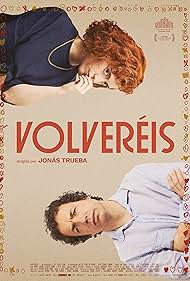After 15 years of being together, Ale and Alex decide to throw a party to celebrate their separation, leaving their loved ones in dismay. French visa no. 161493 delivered 16-7-2024.. References The Naked Truth (1937). VolveréisAuthor: Ana Valladares, Guillermo Briales, Iman AmarMade by Adiós Amores. Most romantic films tell the story of the beginnings of relationships: a boy meets a girl, they fall in love at first sight or gradually, their love goes through all kinds of tests and if the lovers are not separated by fate, the film ends with a wedding or at least a long kiss. ' Volveréis ' (2024 – title in English distribution is 'The Other Way Around') by Spanish director Jonás Trueba tells the story of the end of a love story. The film starts with a crazy but interesting idea. What if the end of a marriage was marked by a party? After all, when a couple gets married, they don’t know exactly what to expect, whereas when they break up, everything is much clearer, and if the breakup is amicable, it’s about two new beginnings that can be just as promising as the beginning of a marriage. So we have all the makings of a romantic or anti-romantic comedy. But (she) is a film director, Alex (he) is an actor. Even their names are almost identical, and at first glance and subsequent glances, they seem like the perfect couple. We never learn why they decided to split after 14 years together. Early in the film, we see a few Sunday morning scenes of the couple at home, with split screens suggesting parallel lives rather than a life together, but their only argument that we witness is a discussion about the film. It is together that they decide to break up and throw a divorce party to which they invite their families and friends. We probably shouldn’t be so surprised, after all, marriage is an optional institution in this part of the world, and the message of the film was probably that love survives separations. Most of the film is filled with meetings with parents, coworkers, good friends, and neighbors, whom they inform of their decision and invite to the party. The reactions are as surprising and varied as those of the audience who watch the film. The two actors playing the main roles (Itsaso Arana and Vito Sanz) are excellent. Like everyone around them in the film, the audience can’t help but fall in love with them, regret their separation, and wonder what made them decide to go their separate ways. The main problem with “Volveréis” is its repetitiveness. At one point, there is even a discussion among filmmakers about linear films (where the plot progresses and something always happens) and circular films (where the same idea is repeated). “Volveréis” is a circular film. It starts with a great idea, but after the second or third conversation with friends or relatives who have been informed about the breakup and have been invited to the party, we understand the principle and wait for something to happen or something else to happen. It doesn’t, and the ending is also predictable in its ambiguity. The writers and director try something quite interesting when they seem to adopt the format of a movie within a movie, but this idea is also abandoned. I almost missed, which is a very rare thing for me, the «American» ending. It will definitely be added to the remake.




 44/12
44/12